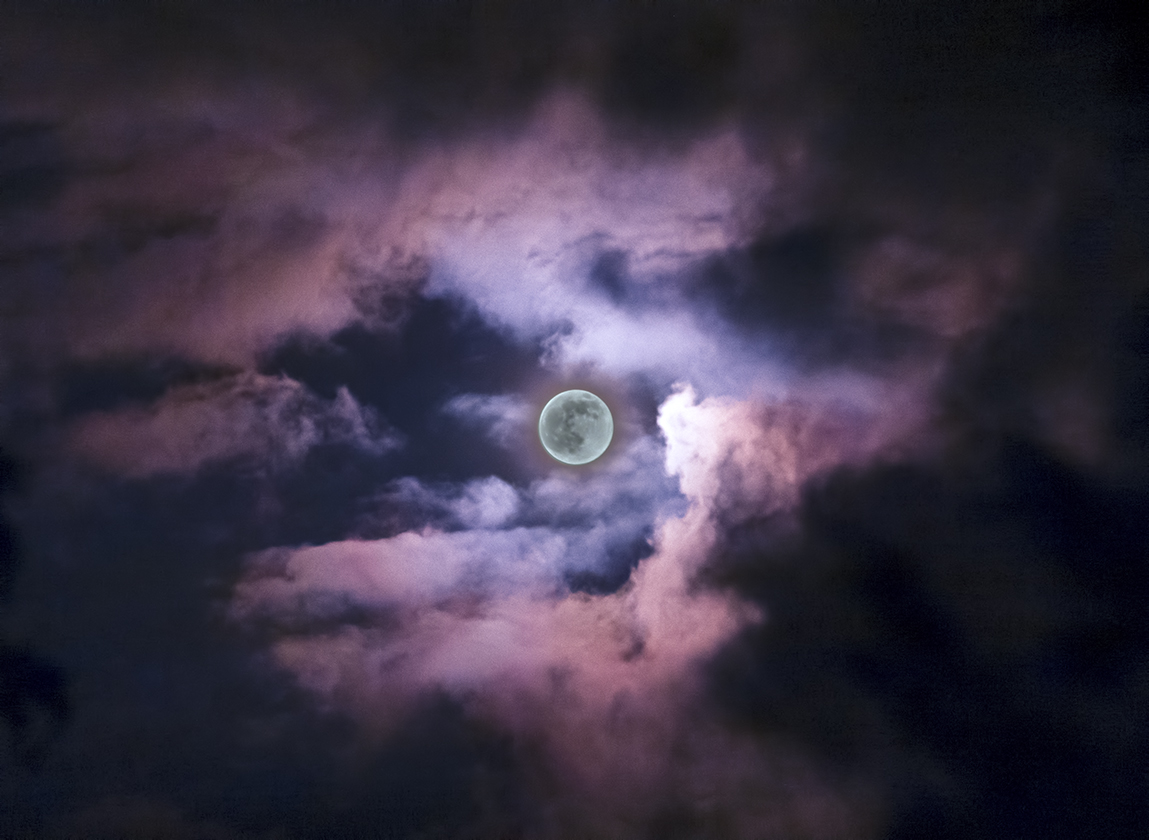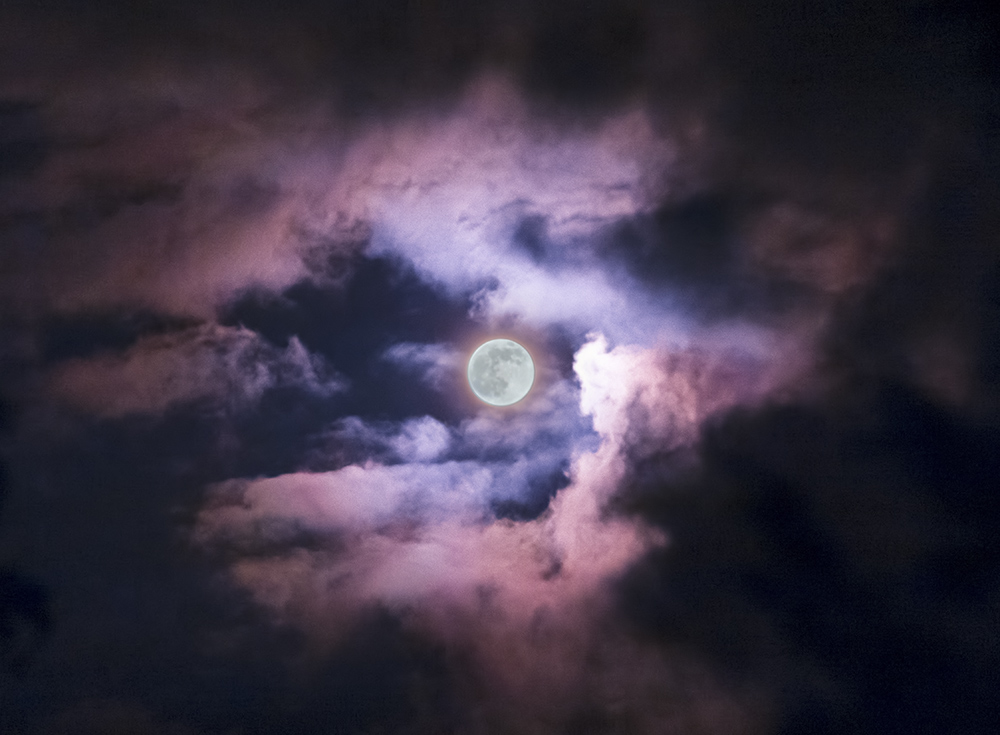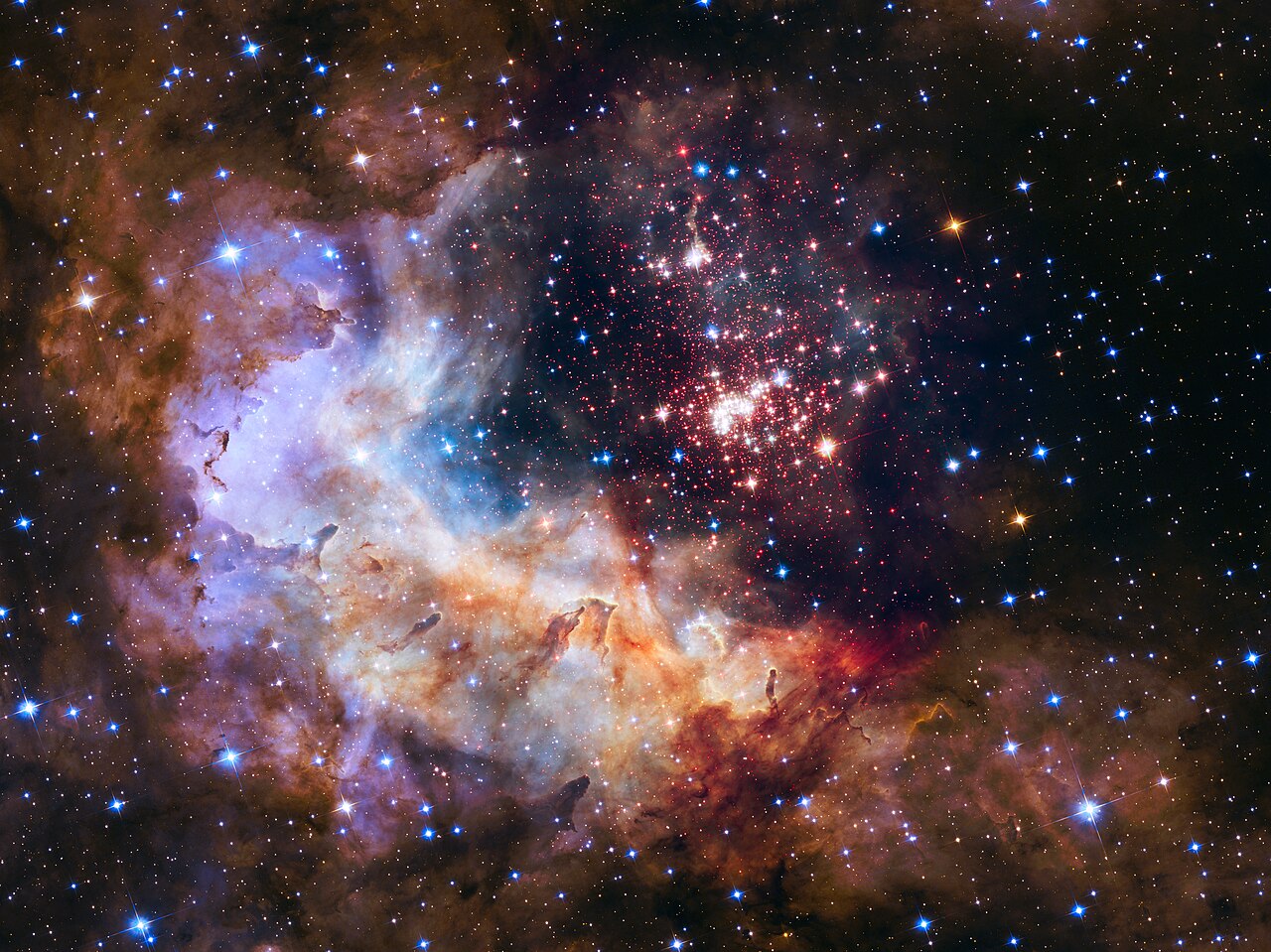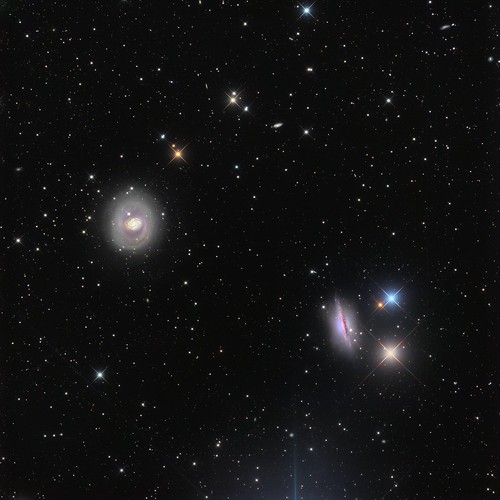Submissions: 2020 March
-
Jean-Baptiste Auroux
- Ensign
- Posts: 78
- Joined: Tue Nov 14, 2017 10:06 pm
Re: Submissions: 2020 March
NGC 2237 Rosette Nebula
Full version : https://cdn.astrobin.com/thumbs/nCM-sSy ... XURFLk.jpg
Setup : Newton astrograph 500mm f/3,6 - ASA DDM85 mount - FLI ProLine16803 - Astrodon filters - Chilescope remote facility
SHO - Total integration : 9h20
Copyright: Jean-Baptiste Auroux
https://millenniumphoton.com/
https://www.astrobin.com/users/Jean-Baptiste_Paris/
Full version : https://cdn.astrobin.com/thumbs/nCM-sSy ... XURFLk.jpg
Setup : Newton astrograph 500mm f/3,6 - ASA DDM85 mount - FLI ProLine16803 - Astrodon filters - Chilescope remote facility
SHO - Total integration : 9h20
Copyright: Jean-Baptiste Auroux
https://millenniumphoton.com/
https://www.astrobin.com/users/Jean-Baptiste_Paris/
-
barretosmed
- Science Officer
- Posts: 482
- Joined: Thu Oct 12, 2017 6:04 pm
Re: Submissions: 2020 March
Milky way through nature
A single frame image
More details:
https://www.astrobin.com/full/yy2xld/C/?nc=user
Equipment:
Canon 6D
Rokinon 14mm 2.4
Single frame 30 "
Iso 1600
PROCESSING:
Adobe Photoshop, PixInsight.
Pousada Campos Misticos
Munhoz - MG - Brazil
06/30/2019
Copyright: Fernando Oliveira de Menezes
Email: Barretosmed@hotmail.com
A single frame image
More details:
https://www.astrobin.com/full/yy2xld/C/?nc=user
Equipment:
Canon 6D
Rokinon 14mm 2.4
Single frame 30 "
Iso 1600
PROCESSING:
Adobe Photoshop, PixInsight.
Pousada Campos Misticos
Munhoz - MG - Brazil
06/30/2019
Copyright: Fernando Oliveira de Menezes
Email: Barretosmed@hotmail.com
Re: Submissions: 2020 March
Re: Submissions: 2020 March
Full Version www.astrobrallo.com/gallery/index.php/M ... ork-Nebula
Ngc 6995 Network-Nebula
Setup: BRC 250 F5, Filter Astrodon 5nm Maunt Mathis 500 CCD Apogee 6303.
Composition SII-Ha-OIII 120' 12' 100'.
taken from the astronomical park Astrobrallo
Copyright: Giacomo Zacchi
Mail: zacchigiacomo@gmail.com
Ngc 6995 Network-Nebula
Setup: BRC 250 F5, Filter Astrodon 5nm Maunt Mathis 500 CCD Apogee 6303.
Composition SII-Ha-OIII 120' 12' 100'.
taken from the astronomical park Astrobrallo
Copyright: Giacomo Zacchi
Mail: zacchigiacomo@gmail.com
- PierandreaFolle
- Ensign
- Posts: 23
- Joined: Thu Mar 05, 2020 4:16 pm
Re: Submissions: 2020 March
The Guardians of the Galaxy
Closing the milky way season here in Italy with this fantastic adventure with my friends....
After 4 hours of walk, we reach Serra Di Crispo peak at 2060 meters, in Pollino National Park, where we spend the night.
After few shots, I saw something strange in the sky. It was the ISS with our italian Captain Luca Parmitano! In the photo you can see the ISS pass with the straight line from the top to the tree! Very amazing..
Closing the milky way season here in Italy with this fantastic adventure with my friends....
After 4 hours of walk, we reach Serra Di Crispo peak at 2060 meters, in Pollino National Park, where we spend the night.
After few shots, I saw something strange in the sky. It was the ISS with our italian Captain Luca Parmitano! In the photo you can see the ISS pass with the straight line from the top to the tree! Very amazing..
Re: Submissions: 2020 March
The Great Carina Nebula Region in SHO
Copyright : Bogdan Borz
A project using the "Very Small Telescope" from Chilescope.
Nikon 200mm
Camera FLI Proline 16200 at -30°
Astrodon filters 3nm Ha, SII, OIII
02/25/2020
Ha 16x600s
SII 15x600s
OIII 15X600s
Processing: Pixinsight v 1.8, Photoshop 2020
Full resolution: https://www.astrobin.com/full/fpn7az/0/
Copyright : Bogdan Borz
A project using the "Very Small Telescope" from Chilescope.
Nikon 200mm
Camera FLI Proline 16200 at -30°
Astrodon filters 3nm Ha, SII, OIII
02/25/2020
Ha 16x600s
SII 15x600s
OIII 15X600s
Processing: Pixinsight v 1.8, Photoshop 2020
Full resolution: https://www.astrobin.com/full/fpn7az/0/
-
barretosmed
- Science Officer
- Posts: 482
- Joined: Thu Oct 12, 2017 6:04 pm
Re: Submissions: 2020 March
Our milky way
A very simple image with little editing
More details:
https://www.astrobin.com/full/6wvgsv/0/?nc=user
Equipment:
Canon 6D
Rokinon 14mm 2.4
Single frame 30 "
Iso 1600
PROCESSING:
Adobe Photoshop.
Pousada Campos Misticos
Munhoz - MG - Brazil
06/30/2019
Copyright: Fernando Oliveira de Menezes
Email: Barretosmed@hotmail.com
A very simple image with little editing
More details:
https://www.astrobin.com/full/6wvgsv/0/?nc=user
Equipment:
Canon 6D
Rokinon 14mm 2.4
Single frame 30 "
Iso 1600
PROCESSING:
Adobe Photoshop.
Pousada Campos Misticos
Munhoz - MG - Brazil
06/30/2019
Copyright: Fernando Oliveira de Menezes
Email: Barretosmed@hotmail.com
Re: Submissions: 2020 March
Bobinius wrote: ↑Thu Mar 12, 2020 8:26 pm The Great Carina Nebula Region in SHO
Copyright : Bogdan Borz
A project using the "Very Small Telescope" from Chilescope.
Nikon 200mm
Camera FLI Proline 16200 at -30°
Astrodon filters 3nm Ha, SII, OIII
02/25/2020
Ha 16x600s
SII 15x600s
OIII 15X600s
Processing: Pixinsight v 1.8, Photoshop 2020
Full resolution: https://www.astrobin.com/full/fpn7az/0/
Beautiful, Bogdan Borz. I have just become aware of your great astrophotography.
Westerlund 2 (crop). Photo: Bogdan Borz.
What I love most about your picture is that it "puts Westerlund 2 into perspective". When I looked at your picture of the Carina Nebula, I recognized everything in it except the little blue crescent at upper right. The reason why didn't recognize it is because I had never before seen a wide angle picture where we can actually see the location in the sky of this great cluster and nebula.
AnnWikipedia wrote:
April 23, 2015: NASA and ESA are celebrating the Hubble Space Telescope's silver anniversary of 25 years in space by unveiling some of nature's own fireworks — a giant cluster of about 3,000 stars called Westerlund 2. The cluster resides inside a vibrant stellar breeding ground known as Gum 29, located 20,000 light-years away in the constellation Carina. The comparatively young, 2-million-year-old star cluster contains some of our galaxy's hottest, brightest, and most massive stars. The largest stars are unleashing a torrent of ultraviolet light and hurricane-force winds that etch away the enveloping hydrogen gas cloud. This creates a fantasy celestial landscape of pillars, ridges, and valleys.
ABOUT THIS IMAGE: The brilliant tapestry of young stars flaring to life resemble a glittering fireworks display in the 25th anniversary NASA Hubble Space Telescope image to commemorate a quarter century of exploring the solar system and beyond since its launch on April 24, 1990.
Color Commentator
-
Robert-Austria
- Ensign
- Posts: 39
- Joined: Thu Nov 17, 2011 3:42 pm
- Location: Austria
- Contact:
Re: Submissions: 2020 March
Lighthouse Cap Fermentor
Sometimes we humans have to make some tight curves - but world keeps turning......
The picture shows the very old lighthouse "Cap Fermentor" located on the northcoast on the Island of Mallorca (Spain) in the Mediterranean sea.
The star trails shows the movement of 70 minutes in direction to the big dipper in March
Equipment:
Canon 600D
Canon 10-22 mm f/4,5
140 frames 30 "
Iso 800
PROCESSING:
PixInsight - Adobe Photoshop
Copyright: Robert Pölzl
Email: robert_lieboch@hotmail.com
Sometimes we humans have to make some tight curves - but world keeps turning......
The picture shows the very old lighthouse "Cap Fermentor" located on the northcoast on the Island of Mallorca (Spain) in the Mediterranean sea.
The star trails shows the movement of 70 minutes in direction to the big dipper in March
Equipment:
Canon 600D
Canon 10-22 mm f/4,5
140 frames 30 "
Iso 800
PROCESSING:
PixInsight - Adobe Photoshop
Copyright: Robert Pölzl
Email: robert_lieboch@hotmail.com
Re: Submissions: 2020 March
'Large Magellanic Cloud in high resolution'
Copyright: Sabine Gloaguen
https://en.sabinegloaguen.com
This mosaic of 7 tiles for 95 mega pixels represents a large field around the Large Magellanic Cloud. I was delighted to be able to obtain such a detailed image with material, all in all, modest for astrophotography.
This irregular galaxy, composed of a single spiral arm, is crossed by a large bar.
It is very rich in celestial objects including the Tarantula nebula (NGC 2070), the largest known nebula. It was in the region of this nebula that we had the chance to discover the candidate planetary nebula FoGl 1 during a trip to Chile in 2018.
Technical details :
Camera CANON EOS 6D modified Astrodon / Optic Skywatcher Esprit 80ED / mount HEQ5.
Total exposure time: 17 hours.
Place of acquisition: Hacienda des Etoiles (Chile).
A better quality image is here : https://cdn.astrobin.com/thumbs/UtzX3dP ... XURFLk.jpg
Please follow this link for the full zoomable version : https://sabinegloaguen.prodibi.com/a/1jeeoyr0oq6moer
Copyright: Sabine Gloaguen
https://en.sabinegloaguen.com
This mosaic of 7 tiles for 95 mega pixels represents a large field around the Large Magellanic Cloud. I was delighted to be able to obtain such a detailed image with material, all in all, modest for astrophotography.
This irregular galaxy, composed of a single spiral arm, is crossed by a large bar.
It is very rich in celestial objects including the Tarantula nebula (NGC 2070), the largest known nebula. It was in the region of this nebula that we had the chance to discover the candidate planetary nebula FoGl 1 during a trip to Chile in 2018.
Technical details :
Camera CANON EOS 6D modified Astrodon / Optic Skywatcher Esprit 80ED / mount HEQ5.
Total exposure time: 17 hours.
Place of acquisition: Hacienda des Etoiles (Chile).
A better quality image is here : https://cdn.astrobin.com/thumbs/UtzX3dP ... XURFLk.jpg
Please follow this link for the full zoomable version : https://sabinegloaguen.prodibi.com/a/1jeeoyr0oq6moer
Re: Submissions: 2020 March
Thank you so much for this great image!Amarante wrote: ↑Sun Mar 15, 2020 10:55 am 'Large Magellanic Cloud in high resolution'
Copyright: Sabine Gloaguen
https://en.sabinegloaguen.com
This mosaic of 7 tiles for 95 mega pixels represents a large field around the Large Magellanic Cloud. I was delighted to be able to obtain such a detailed image with material, all in all, modest for astrophotography.
This irregular galaxy, composed of a single spiral arm, is crossed by a large bar.
It is very rich in celestial objects including the Tarantula nebula (NGC 2070), the largest known nebula. It was in the region of this nebula that we had the chance to discover the candidate planetary nebula FoGl 1 during a trip to Chile in 2018.
Technical details :
Camera CANON EOS 6D modified Astrodon / Optic Skywatcher Esprit 80ED / mount HEQ5.
Total exposure time: 17 hours.
Place of acquisition: Hacienda des Etoiles (Chile).
A better quality image is here : https://cdn.astrobin.com/thumbs/UtzX3dP ... XURFLk.jpg
Please follow this link for the full zoomable version : https://sabinegloaguen.prodibi.com/a/1jeeoyr0oq6moer
Ann
Color Commentator
- Robin_Onderka
- Ensign
- Posts: 47
- Joined: Sat Mar 07, 2020 6:54 pm
Re: Submissions: 2020 March
In glory of Cyril and Methodius (panorama)
Location:
On top of Radhošť. Radhošť is a mountain in the Czech Republic 1129 meters above sea level with a view of the Beskydy mountains. There is a television transmitter, which you can see on a photo, and few other interesting objects, including a chapel (built 1898) and a sculpture of Saints Cyril and Methodius located on the summit to glorify their evangelization of Slavic people.
The mountain is a popular destination for religious pilgrimages. Referred to as the place of Slavic god Radegast, Radhošť was the host of sacred ceremonies to rejoice the god during the time of Slavic antiquity. The name Radhošť is in fact a czech version of the name of Radegast.
There is also a pilgrimage path of Cyril and Methodius, which I underwent to take this photo.
Exif:
12 panel panorama in 2 rows on 24 mm, 8 photos stacked of each panel to reduce noise
13” f/2.8 ISO 5000
65 megapixels photo
Date: Sat 14. 3. 2020 around 9 - 10pm
 In glory of Cyril and Methodius by Robin Onderka, on Flickr
In glory of Cyril and Methodius by Robin Onderka, on Flickr
Location:
On top of Radhošť. Radhošť is a mountain in the Czech Republic 1129 meters above sea level with a view of the Beskydy mountains. There is a television transmitter, which you can see on a photo, and few other interesting objects, including a chapel (built 1898) and a sculpture of Saints Cyril and Methodius located on the summit to glorify their evangelization of Slavic people.
The mountain is a popular destination for religious pilgrimages. Referred to as the place of Slavic god Radegast, Radhošť was the host of sacred ceremonies to rejoice the god during the time of Slavic antiquity. The name Radhošť is in fact a czech version of the name of Radegast.
There is also a pilgrimage path of Cyril and Methodius, which I underwent to take this photo.
Exif:
12 panel panorama in 2 rows on 24 mm, 8 photos stacked of each panel to reduce noise
13” f/2.8 ISO 5000
65 megapixels photo
Date: Sat 14. 3. 2020 around 9 - 10pm
 In glory of Cyril and Methodius by Robin Onderka, on Flickr
In glory of Cyril and Methodius by Robin Onderka, on Flickr-
barretosmed
- Science Officer
- Posts: 482
- Joined: Thu Oct 12, 2017 6:04 pm
Re: Submissions: 2020 March
Milky way and its predominance of hydrogen
In this image we have two points to mention:
1) Made with a modified camera (removing the Ir CUt filter and adding a baader filter, increasing the pass band [improving H-alpha capture)
2) A narrow band filter (Dual Narrouband composed of H-alpha and OIII) is used.
H-alpha is related to the capture of Hydrogen. Light is created by the hydrogen atom, the main constituent of the universe and the basis of the nuclear fusion that feeds the stars. H-alpha is red in part of the light spectrum and contributes to an overwhelming red color in most nebulae
So we have by the two methods mentioned an extreme predominance in the uptake of H-alpha, showing in red in the the milky way.
BEST DETAIL:
https://www.astrobin.com/full/prs57t/0/?nc=user
Equipment:
Canon 6D
Rokinon 14mm 2.4
Filter TC Astro Duo-Narrowband Filter
Single frame 30 "
Iso 1600
PROCESSING:
Adobe Photoshop.
Place and Date:
Munhoz - MG - Brazil
06/30/2019
Copyright: Fernando Oliveira de Menezes
Email: Barretosmed@hotmail.com
In this image we have two points to mention:
1) Made with a modified camera (removing the Ir CUt filter and adding a baader filter, increasing the pass band [improving H-alpha capture)
2) A narrow band filter (Dual Narrouband composed of H-alpha and OIII) is used.
H-alpha is related to the capture of Hydrogen. Light is created by the hydrogen atom, the main constituent of the universe and the basis of the nuclear fusion that feeds the stars. H-alpha is red in part of the light spectrum and contributes to an overwhelming red color in most nebulae
So we have by the two methods mentioned an extreme predominance in the uptake of H-alpha, showing in red in the the milky way.
BEST DETAIL:
https://www.astrobin.com/full/prs57t/0/?nc=user
Equipment:
Canon 6D
Rokinon 14mm 2.4
Filter TC Astro Duo-Narrowband Filter
Single frame 30 "
Iso 1600
PROCESSING:
Adobe Photoshop.
Place and Date:
Munhoz - MG - Brazil
06/30/2019
Copyright: Fernando Oliveira de Menezes
Email: Barretosmed@hotmail.com
-
tommasostella
- Ensign
- Posts: 60
- Joined: Mon Nov 11, 2019 4:34 pm
Re: Submissions: 2020 March
NGC 2264
189x300s with Apochromatic 102@f/7
Copyright: Tommaso Massimo Stella
189x300s with Apochromatic 102@f/7
Copyright: Tommaso Massimo Stella
-
Lefty's Astrophotography
- Ensign
- Posts: 21
- Joined: Mon Mar 16, 2020 12:32 am
Re: Submissions: 2020 March
My HDR composite of the 2019 Mercury transit:
 2019 Transit of Mercury - HDR Composite by Lefty's Astrophotography, on Flickr
2019 Transit of Mercury - HDR Composite by Lefty's Astrophotography, on Flickr
Direct link to the full res image on my Flickr
https://live.staticflickr.com/65535/496 ... 1103_o.png
 2019 Transit of Mercury - HDR Composite by Lefty's Astrophotography, on Flickr
2019 Transit of Mercury - HDR Composite by Lefty's Astrophotography, on FlickrDirect link to the full res image on my Flickr
https://live.staticflickr.com/65535/496 ... 1103_o.png
Re: Submissions: 2020 March
M16 LRGBHa

M16 LRGBHa by Cel Fosc, en Flickr
Copyright: Jose M Rguez Paredes
Web: https://celfoscastrofotografia.blogspot.com/
Setup
Telescopio: ED80 Sky Watcher + 0.85X
Montura: LXD75 Meade
Cámara: QHY163m
Guiado: MiniScope 50mm Orion, CámaraGuia/QHY5 L-II c
Adquisición: APT (AstroPhotographyTool) 3.70
Apilado y procesado: PixInsight, Photoshop
Tomas
L: 10x600s bin1
RGB: 10x300s bin2
Ha: 10x600s bin1
Expo Total: 5h 50 min
Temperatura sensor: -10°C
Distancia Focal: 510mm
F/ 6,3

M16 LRGBHa by Cel Fosc, en Flickr
Copyright: Jose M Rguez Paredes
Web: https://celfoscastrofotografia.blogspot.com/
Setup
Telescopio: ED80 Sky Watcher + 0.85X
Montura: LXD75 Meade
Cámara: QHY163m
Guiado: MiniScope 50mm Orion, CámaraGuia/QHY5 L-II c
Adquisición: APT (AstroPhotographyTool) 3.70
Apilado y procesado: PixInsight, Photoshop
Tomas
L: 10x600s bin1
RGB: 10x300s bin2
Ha: 10x600s bin1
Expo Total: 5h 50 min
Temperatura sensor: -10°C
Distancia Focal: 510mm
F/ 6,3
-
Iaffaldano Giuseppe Carmine
- Ensign
- Posts: 54
- Joined: Sun Jun 18, 2017 10:13 am
- Location: TARANTO
-
Iaffaldano Giuseppe Carmine
- Ensign
- Posts: 54
- Joined: Sun Jun 18, 2017 10:13 am
- Location: TARANTO
Re: Submissions: 2020 March
Great picture!Iaffaldano Giuseppe Carmine wrote: ↑Mon Mar 16, 2020 9:34 pm Fox Fur and Cone Nebulas
Ngc2264_Lrhgb+zw by gc.iaffaldano, su Flickr
Well done!
Ann
Color Commentator
Re: Submissions: 2020 March
That is a superb, detailed and beautifully colorful widefield view of the gaseous and dusty features surrounding hot bright star S Monocerotis in the NGC 2264 region of star formation.tommasostella wrote: ↑Sun Mar 15, 2020 9:04 pm NGC 2264
189x300s with Apochromatic 102@f/7
Copyright: Tommaso Massimo Stella
Ann
Color Commentator
Re: Submissions: 2020 March
Sh2-284 is a HII star forming region of gas and dust located in the constellation Monoceros approximately 15 thousand light years from the Earth. This remarkable nebula resembles the more familiar Rosette Nebula (Caldwell 49). Along the edges of Sh2-284 are several "elephant trunk" formations. These are monstrous pillars of gas and dust that stretch into the central void of the nebula. Perhaps the most prominent of the pillars is located to the left center of the nebula. It resembles the forefinger of a hand pointing to the stars in the center of the nebula. These pillars are formed by intense radiation and stellar winds radiating from the very hot stars of the central open cluster designated Dolidze 25. The radiation and wind from the cluster is responsible for clearing the central void in the surrounding nebula. Dolidze 25 is a very young cluster with an estimated age of approximately 3 to 4 million years.
Astrodon Ha 48 x 10'
Astrodon OIII 36 x 10'
Astrodon SII 36 x 10'
Total integration = 20 hours.
www.KinchAstro.com
Astrodon Ha 48 x 10'
Astrodon OIII 36 x 10'
Astrodon SII 36 x 10'
Total integration = 20 hours.
www.KinchAstro.com
-
mdieterich
- Ensign
- Posts: 99
- Joined: Fri Feb 13, 2015 5:50 pm
Re: Submissions: 2020 March
Milky Way from 35,000ft up in a plane
www.mdieterichphoto.com
Copyright: Matt Dieterich Here's a view of the Milky Way I captured setting over the South Atlantic from 35,000ft in a plane while flying 570 mph. I had some funny looks hunched over a tripod with a blanket covering myself to prevent glares on the window, but so worth the excitement! I used a Nikon D850 with 14mm lens at F2.8, 15 second, and ISO20,000.
www.mdieterichphoto.com
Copyright: Matt Dieterich Here's a view of the Milky Way I captured setting over the South Atlantic from 35,000ft in a plane while flying 570 mph. I had some funny looks hunched over a tripod with a blanket covering myself to prevent glares on the window, but so worth the excitement! I used a Nikon D850 with 14mm lens at F2.8, 15 second, and ISO20,000.











